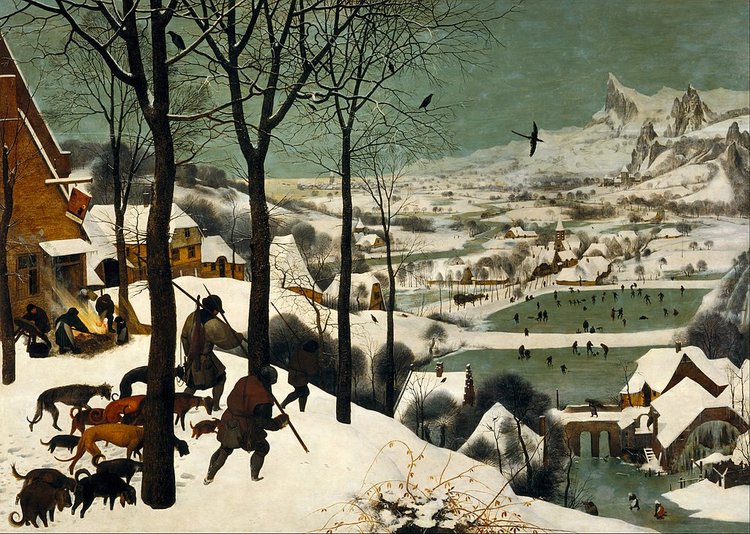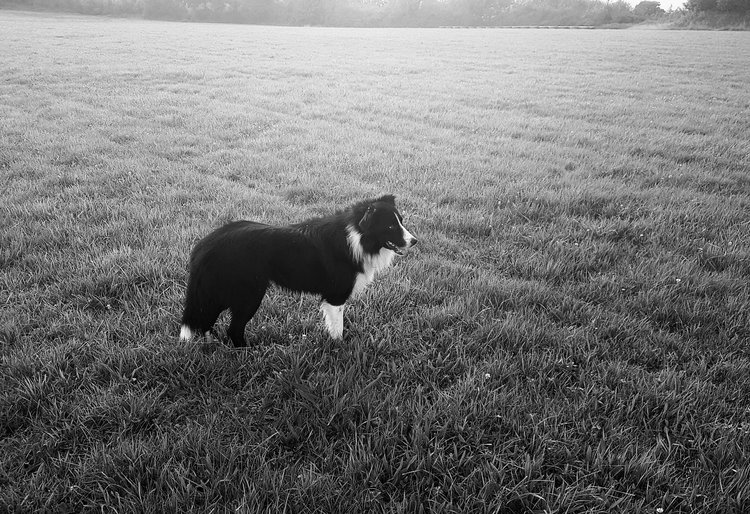Art Encounters | The Rescue Act II
Back in May of this year I wrote an Art Encounters article called The Rescue Act. It was about the events that led to my adopting a border collie called Oscar. The title was a bit tongue-in-cheek, like the title of an action movie and I was the star performer. Like what happens with action movies in general, I considered bringing out a summer sequel. It had been a long time since I owned a dog, and I found the adoption experience quite emotional. It brought with it a sway of emotion I hadn’t expected. So in the intervening months, because so many people would ask how Oscar was getting on, I toyed with the idea of writing a follow up article.
The sequel would report on how things were going since Oscar became an established member of our family. But I didn’t know where to start. Every time I did start it didn’t seem right. There were so many things to say I didn’t know how to begin. Would I start with the fact that after bringing Oscar home he lay on the ground beside an empty bed in our patio veranda, his one bedroom apartment, for three whole days and nights? And then on the fourth night I looked in through the glass and saw that he was lying in his bed, curled up and asleep. Would I write about how this made me cry? That I hadn’t felt such a force of emotion in a long time? And then I’d stand there just looking at him, like I did with my two sons when they were babies.
No. That would be too personal. The first article already broached enough personal stuff. No, I’d write about the fact that, when I recounted stuff that popped into my head on the journey with my son to collect Oscar in Clare, I’d left something out. I mentioned that the image of Bruegel’s painting Hunters in the Snow had come into my mind but I hadn’t mentioned that it was followed by the image of another of Bruegel’s paintings, The Harvesters. One succeeded the other like a sequence of film. And yet I only mentioned one. I felt a bit guilty in the aftermath of publishing the article that I hadn’t mentioned both. I zoned in on the image that better suited the tone of the article in general. So if I was to write another article, The Rescue Act II, analyzing the meaning behind this second Bruegel painting coming to mind when traveling to collect Oscar I’d probably undermine the credentials (and my sincerity) of the first article. I’d look like a fraud. And yet it was bugging me that I didn’t mention this second painting of a summer scene in the context of the first. It was summer when I drove to collect Oscar that evening, when both Bruegel’s painting came to mind. I was travelling with sunlight beaming in the window. So what was the reason behind this second painting coming to mind after the first? What was its meaning as such? And why not mention it?

The Harvesters is a late summer scene. A group of farmers, and no doubt family members, are harvesting wheat. Some are taking a well-earned break. Others are working away. The painting is a snapshot of a world that is practically lost to us today; contractors have replaced a quid quo pro farming community that involves neighbours helping each other out. Bruegel celebrates this coming together of the farming community. It’s a painting that seems to work in the opposite direction to the coldness and loneliness he associates with winter in Hunters in the Snow. I have no idea why this second painting came to mind. But if I was to write The Rescue Act II I would feel compelled to investigate its deeper meaning for me. Maybe it would involve looking into the deep, often-unrecognized, trauma that has descended upon our sense of being here in Ireland? That for centuries we lived a life here that depended on our helping each other out with regard to the land. But now that’s pretty much gone. Like in Bruegel’s painting neighbours would come together to reap the harvest, moving from one farm to another over the course of weeks. If I wrote The Rescue Act II, I’d explore The Harvesters in the broader context of care, the custom of doing things for other beings. When driving that evening to pick up a stray dog from a farm, from people I didn’t really know, I felt I was tapping into the stuff Bruegel depicts, stuff that hasn’t been reduced to a contract or a bureaucratic detail, like so such in life today. It is noteworthy then that Bruegel celebrated the kind of practices depicted in The Harvesters as barometers of a nation’s soul. He would travel in rural Netherlands in cognito, returning to the city to make paintings about these practices. Maybe I thought of The Harvesters when I did because I felt I was making contact with customs that are similar in kind, and that are all the more important because they haven’t – as yet – been entangled in bureaucracy and red tape?
But I felt I was overanalyzing, complicating stuff. And I don’t really have the energy to pursue this line of inquiry at length. I then thought it would be more inspiring to explore what I speculate about when walking Oscar in the woods and fields that surround where I live. It might be more enjoyable to write. I often speculate about the years before Oscar became a part of my life: the ‘before.’ Sometimes I speculate that a farmer who died had owned him, and his family were then called up upon to put him down or find him a new home. But instead of doing this they drove for twenty miles and dumped him on the street. For six weeks he lived the life of a stray, before making his way to the farm in Clare where I collected him. I often make up a drama in my head that takes the form of dialogue between family members concerning what to do with Oscar, before he is abandoned:
‘What’ll we do with the dog when Granddad’s gone?’
‘We’ll have to get rid of him. Nobody wants sheepdogs these days.’
‘Bring him to the pound. They’ll look after him.’
‘You’ll mean they’ll put him down?’
‘I suppose. I don’t fuckin’ know.’
‘Will Johnny up the road take him?’
‘Sure he has two dogs already.’
‘Just get rid of him.’
I had planned to write a longer dialogue set in the time of a ‘before,’ the time when Oscar was abandoned. And I’d call it The Rescue Act II. The dialogue would be a kind of fiction. But my reasons for writing it would be to explore adopting a dog in the context of what it means to adopt in general: to decide to care for another being whose past is unknown to us. How do we fill in the blanks when the blanks are so big? And this would generate a kind of covert discussion of what it means to care for someone whose past is not known at all. But I decided not to write this because I felt the dialogue might be too obscure, and that it would turn out too abstract for readers who hadn’t read the first article.

I should have written it. Shouldn’t I? And not take such stock in what others think. So what if they don’t get it? But I didn’t have the energy. Plus, ideas were cluttering up in my head, and the truth is I didn’t want to give this idea greater precedence than others. So I sat at my computer not knowing where to start.
The changes in Oscar over the last few months have been subtle as opposed to dramatic. I used to have to carry him into the car, now he jumps in. Now, once he sees his lead dangling in my hand he goes ballistic. He views walks in the same way kids view Santa: manna from the Gods. He used to spend practically all his time in the little patio we’ve designated as his home within the house. But, after three months, he has little spots in the garden he likes to relax in. He can often be seen chillaxing under a palm tree, wandering out the back of the house to survey the surroundings. He never barks. But now he whimpers a little if I stop to chat with someone when we’ve begun a walk, or a run, or a walk that morphs into a run to speed up his exercising time. Yes, I began running in the woods as a more effective means of expending his and my own energy and therefore giving us more exercise.
I was going to report on all these things in The Rescue Act II. But then I didn’t know what connection this would have with the ‘Art Encounters’ series of which it would be a part. So I decided to ditch this idea. I then considered writing about a recurring but positive thought I have that Oscar came into my life because, as we say in Ireland ‘someone is looking down on me.’ I don’t know where this thought comes from, maybe religion and the idea of intervention from above, or my interest in David Lynch films. David Lynch’s work epitomizes a tendency we have in general to think that someone, somewhere, is dictating our decisions; a puppet master is pulling strings behind our back. In so many Lynch films, a little man sits in a room pulling on levers, like a puppet master or a deity pulling the strings on another person’s lives. The man/puppet is hidden away in a room, giggling to himself while the person whose life he’s controlling is in the throes of an existential meltdown, convinced that the act unfolding in front of them is of their own doing alone. The dwarf Michael J. Anderson plays this scary puppet master role in a number of Lynch films, but most emphatically – in my view – in his masterpiece Mulholland Drive. Anderson has a particularly malevolent role in Mulholland Drive, but a positive comparison can still be made. I entertain the contrary idea that Oscar came into my life because someone, somewhere, is pulling strings, except in my case as a kind of reward. I even think that Oscar came into my life because someone, somewhere felt he should. At a time when I needed to feel the power of life, this gentle loveable dog came into my life.
Do I really believe this ‘looking down on me’ stuff? Or course not. But I still entertain it, which is weird. I intended writing the Rescue Act II about how this weirdness rescues us from the despair of the world. The Rescue Act II would explore the idea of someone pulling the strings on my life as a kind of reward. But I decided not to write it, not because it’s an irrational thought, a weird fantasy I have when walking, but because thoughts like these are just a way of coping with the challenges of the day as they come upon us. Sometimes the struggles in our life are easier to deal with if we think someone is looking out for us. It’s called coping with shit. But I think I’ll leave writing about coping with shit alone for the moment. I’ll bring the dog for a walk and think about something lighter. I’ll then get on to the HeadStuff editors, Alan and Paddy, when it all starts coming together. It could turn into something interesting.
More from the Art Encounters series can be found here.
